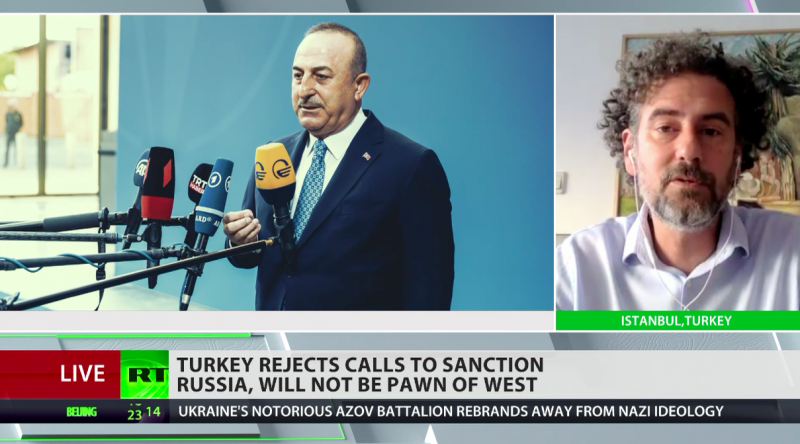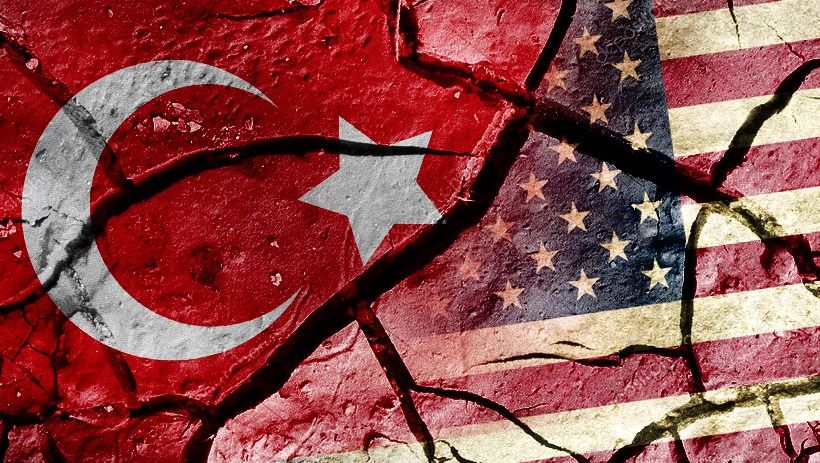Turkey is once again in the center of different corridors: one currently in debate is to be opened from Odessa to the world, in order to export stored wheat. The other runs along the north of Syria, where Turkey has already pursued three different military operations to establish a safe zone against what it calls the “corridor of terror” by the US-supported PKK.
The Ukraine crisis, with Sweden and Finland’s following NATO membership application and Turkey’s veto has put Turkish-Western relations into spotlight once again.
United World International expert Soner commented on these issues on Russia Today. Below we present the interview as aired by RT International.
We are talking to Yunus Soner, Turkish political scientist. Good to see you. I’d like to ask you why has Turkey elected to reject this Western pressure and not sanction Russia, unlike its NATO allies?
That is a very good question, let us try to sum it up in three points.

There is first of all long–term reasons for Turkey’s decision. Turkey has been fighting against US-supported terror groups for the last 40 years. Turkey2s economic base, that is, its industrial and agricultural base has been destroyed by the country’s inclusion into the Western economic sphere. And lastly, one has to remember that the Turkish republic has been founded by a war of liberation against Western powers. So, these are long-term reasons for Turkey’s stance.
Short-term reasons are that Turkey has witnessed a US-supported coup in 2016, and has been encircled by the United States militarily. Just recently, President Erdoğan stated that the US military bases in Greece were not directed against Russia, he qualified that statement as, quote unquote, a lie. Thus implying these bases were established against Turkey.
Thirdly, there is the visionary reason, the issues connected less with the past and more with the future. This is more about perspective. And here, Turkey clearly recognizes that Asia and Eurasia is the emerging power, both in terms of economy and security, while the West is in decline.
Thus, the Turkish economy as well as the Turkish politics looks every day more and more to Asian countries, to Russia, to China, to of course also India. So this a complex of factors that has led Turkey to take the position it has chosen, this is not a decision of just today or one limited to Ukraine.
NATO wants Turkey’s obedience – that endangers the country’s existence
Perhaps, Ankara’s decision to remain neutral is not only political because Ankara relies heavily on Russian gas, doesn’t it? What do you think is more important for Turkey: maintaining strong relations with Russia or its NATO membership?
Well, what NATO wants from Turkey is obedience. And that obedience would in our case mean to obeying the actual division of our country along ethnic and sectarian lines, because this is the NATO plan for Turkey, the US plan for Turkey. Dividing our country along ethnic and sectarian lines. We would have to accept that if we preferred NATO membership over the alliance with Russia. We would than have to accept for a constitutional change in Turkey, which would introduce new, different regions in our country along ethnic lines. And then deepening ethnic and sectarian conflicts.
This is a No Go. And this is far beyond the matter of gas or short-term economic interests we have with Russia. It is about Turkey’s existence.
About the Black Sea ports: The West is blaming Russia for Ukrainian ships with wheat on board being stuck in ports. But Turkey is saying that Kyiv has mined the ports making them unable to pass. What’s your take on that situation?
I think that this is an important conflict and the position that Turkey has taken there, criticizing Ukraine for mining the ports is also very importance stance, contradicting the idea that Turkey was “neutral”. Actually, Turkey is here proposing de-escalation on the Ukrainian side, which is quite positive.
Some US news outlets are referring to Turkey now as “Putin’s secret weapon”. Is that something you would agree with?
No, I would not agree with that. Not because I would doubt that Turkey insists on its alliance, or good relations with Russia. I would qualify this reporting as a method of further pressuring Turkey to abandon its current position and obey more to what the United States demands from Ankara. Which, as I told you before, is objectively very hard to do.
Turkey so far has resisted Western pressure to turn against Russia. What measures could the West undertake against Turkey if it continues to not fall in line?
There is of course the classical method of economic pressure that the West can impose on our country. Unfortunately, Turkey has become to a certain degree dependent on European and American capital for refinancing its foreign balance of payments.
Secondly, the United States may use the PKK inside Turkey to provoke some terror attacks, as well as certain Syrian terror groups that have ties to forces within the Turkish territory.
And thirdly, Washington may push Greece to a more aggressive action towards Turkey in the Aegean Sea and the Eastern Mediterranean. This is also a very serious threat that Turkey is facing. These are the three main points of possible threats: economic pressure, internal terror and chaos and regional pressure mainly by Greece.

















Leave a Reply